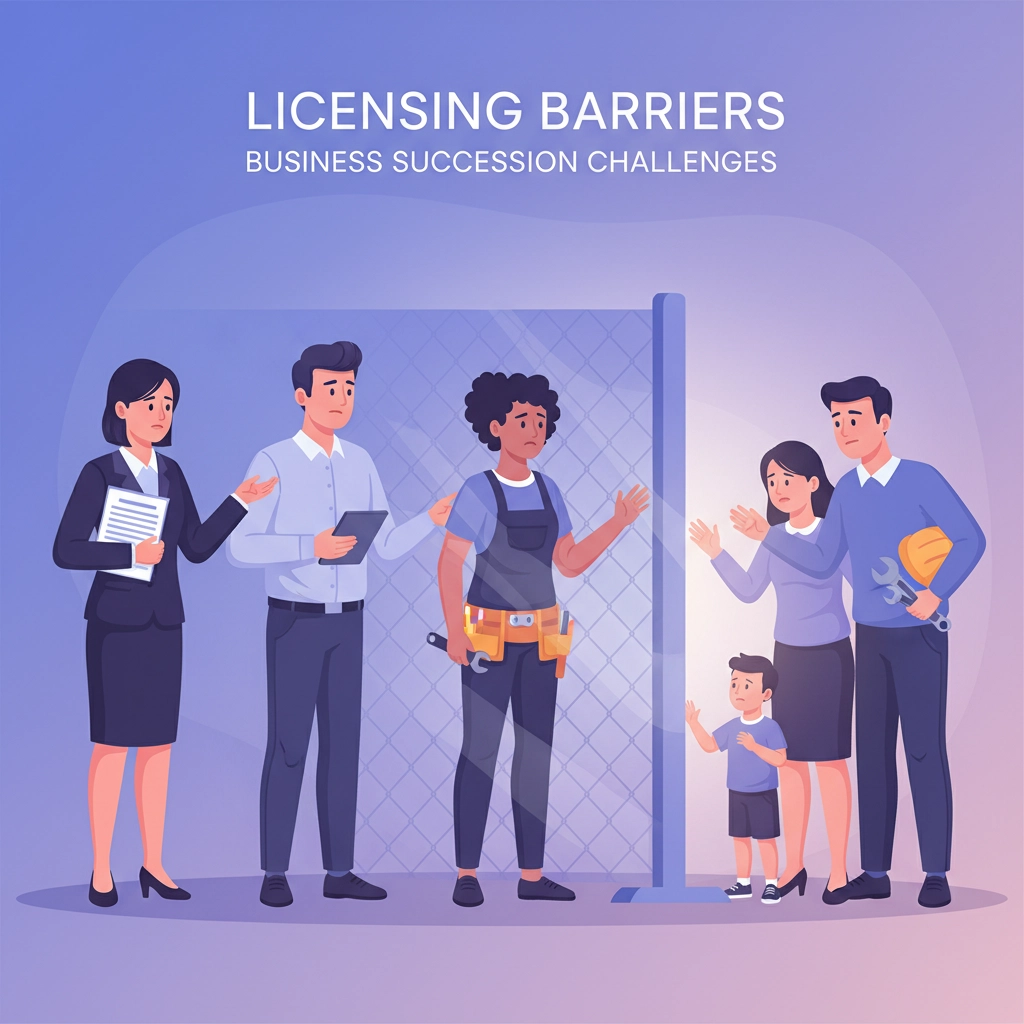New Jersey's Succession Planning Rules: What Small Business Owners Need to Know Before 2026
- Jayme Lin Rose

- Oct 26, 2025
- 5 min read
Updated: Nov 8, 2025
Picture this: You've spent decades building your successful law practice in New Jersey. Your spouse has supported you every step of the way, but they're not an attorney. Tomorrow, something happens to you. What happens to your firm? Your clients? Your family's financial security?
If you're like most business owners in licensed professions, you haven't thought about this enough. And with significant changes coming in 2026, time is running out to get your house in order.
The Licensing Problem Most Business Owners Ignore
Here's what makes succession planning tricky for licensed professionals in New Jersey: only certain people can legally own your business.
In New Jersey, only licensed attorneys can own law firms. Insurance agencies need licensed insurance professionals in ownership roles. Accounting firms require CPAs for ownership. Even in trades like plumbing or electrical work, the business often needs a master license holder involved in ownership or management.
This isn't just red tape, it's the law. And when you pass away or become incapacitated, these rules don't disappear. Your loving spouse, your brilliant adult children, or your trusted business partner might be perfectly capable of running your business. But if they're not licensed, they legally can't own it.

What Happens When Succession Goes Wrong
Let me paint you a picture of what we see too often:
The Law Firm Scenario: A solo practitioner dies suddenly. His wife inherits everything according to his will, but New Jersey law prohibits non-attorneys from owning law firms. The practice must be wound down, clients transferred, and the family loses the ongoing value of the business they spent years building.
The Insurance Agency Story: A successful insurance agent built a thriving agency over 20 years. When she becomes incapacitated, her adult son wants to continue the business, but he's not licensed. The agency's contracts and client relationships can't legally transfer to him without proper licensing.
The Trade Business Problem: A master electrician owns a successful electrical contracting business. His retirement plan was to pass it to his son, but his son chose a different career path and isn't licensed. Without a licensed electrician in ownership, the business can't continue operating under its current structure.
These aren't hypothetical situations, we see them all the time. And they're completely preventable with proper planning.
Industry-Specific Rules You Need to Know
Law Firms
New Jersey Rule of Professional Conduct 5.4 is crystal clear: lawyers can only form partnerships with other lawyers for practicing law. Non-lawyers cannot have ownership interests in law firms or share in legal fees, with very limited exceptions.
Your options:
Partner with another attorney who could take over
Create a succession agreement with another firm
Establish a plan to wind down the practice properly
Set up insurance policies to replace lost income
Insurance and Financial Services
Insurance agencies in New Jersey need licensed producers involved in ownership. Financial advisory firms often have similar requirements depending on their structure and services offered.
Planning strategies:
Identify licensed employees or partners who could assume ownership
Create management agreements that comply with licensing requirements
Establish buy-sell agreements with specific licensing provisions
Consider merging with or selling to another licensed firm

Accounting and Tax Services
CPA firms have ownership restrictions, and even non-CPA tax preparation businesses often have licensing requirements for certain services.
Key considerations:
Determine which services require specific licenses
Plan for client notification requirements
Create agreements for practice continuation
Establish proper insurance coverage
Trades and Hospitality
Master licenses in trades like plumbing, electrical, and HVAC often come with business ownership implications. Even hospitality businesses may have liquor licenses or other permits tied to specific individuals.
What to plan for:
License transfer requirements
Permit continuation procedures
Employee licensing and certification
Regulatory compliance during transitions
Your Action Plan: 5 Steps to Take Before 2026
Step 1: Map Out Your Licensing Requirements
List every license, permit, and certification your business needs to operate. Identify which ones are tied to you personally and which ones can be transferred or assigned to others.
Step 2: Identify Potential Successors
This might be:
Licensed employees who could become partners or buyers
Other firms in your industry for merger or acquisition
Professional management companies (where legally allowed)
Family members willing to obtain necessary licenses
Step 3: Create Legal Documentation
Work with an attorney experienced in your industry to create:
Buy-sell agreements that address licensing requirements
Succession plans that comply with professional rules
Powers of attorney that work within licensing constraints
Insurance policies that protect your family's financial interests

Step 4: Plan for the Transition Period
What happens in the immediate aftermath of your death or incapacity? Who will:
Notify clients and regulatory bodies
Manage day-to-day operations
Handle licensing transitions
Protect confidential information
Step 5: Regular Reviews and Updates
Professional licensing rules change. Your family situation changes. Your business grows. Review and update your succession plan at least annually.
Why 2026 Matters More Than Ever
Two major factors make 2026 a critical deadline:
Federal Estate Tax Changes: The current federal estate tax exemption is set to drop significantly in 2026, potentially from around $13 million to roughly $7 million per person. For business owners with valuable practices, this could mean much higher estate tax bills for your heirs.
New Jersey Regulatory Updates: Various professional licensing boards are updating their rules and requirements. Getting your succession plan in place now, before these changes take full effect, gives you more options and flexibility.
The Cost of Waiting
Every month you delay succession planning, you're gambling with your family's financial security and your clients' welfare. Licensed professional practices often represent the majority of a family's wealth, but without proper planning, this wealth can evaporate due to regulatory requirements.
We've seen too many families lose businesses worth hundreds of thousands, or even millions, of dollars because the owner thought they had more time to plan.
Moving Forward: What Success Looks Like
A well-planned succession strategy for licensed professionals typically includes:
Clear documentation of who can legally take over your business
Financial arrangements that protect your family even if the business structure must change
Client transition plans that maintain relationships and trust
Regulatory compliance strategies that keep you in good standing
Insurance coverage that bridges any gaps in the transition
The goal isn't just to have a plan on paper: it's to create a roadmap that actually works when your family needs it most.
Your Next Steps
If you're a licensed professional in New Jersey and haven't addressed succession planning yet, don't wait until 2026. The complexities of professional licensing requirements mean this isn't something you can handle with a generic estate planning template.
Start by inventorying your licenses and permits. Then, have honest conversations with your family about who could realistically take over your business. Finally, work with professionals who understand both succession planning and your industry's specific requirements.
Your business represents years of hard work and expertise. Your family deserves to benefit from that work, and your clients deserve continuity of service. Proper succession planning makes both possible, but only if you act before it's too late.
The clock is ticking toward 2026. The question isn't whether you need a succession plan: it's whether you'll create one while you still have time to do it right
Contact us today for a free consultation. we can assist you in getting the ball rolling!
Comments